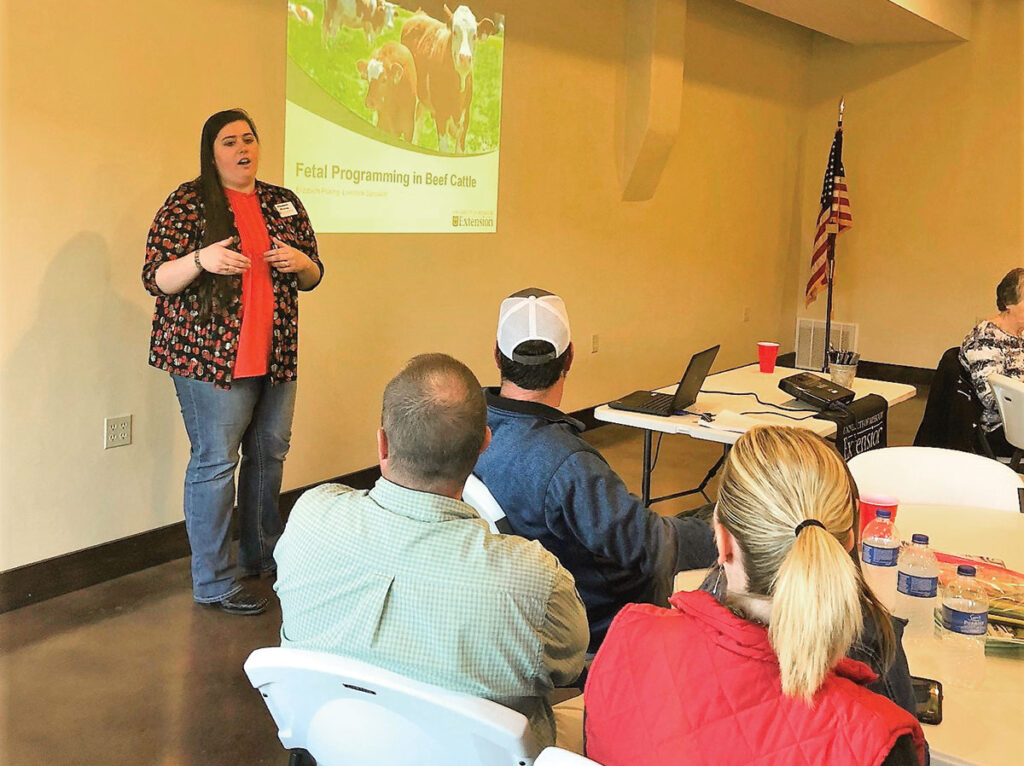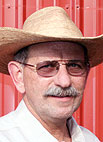
Despite not growing up on a farm, Elizabeth Picking knew she wanted to work with livestock
WEST PLAINS, MO. – Helping farmers improve their livestock operations is the role of University of Missouri-Extension Livestock Field Specialist Elizabeth Picking. But, it wasn’t exactly the path she had planned.
“I didn’t know a lot about what an Extension agent did,” Elizabeth said. “A lot of folks don’t know what Extension does. When I was a kid, I thought, like every other kid who likes animals, I would be a veterinarian. I worked for a vet in high school and saw some not-so-nice things about it. I went into college knowing I didn’t want to be a vet, but I wanted to work with livestock; I didn’t know what my options were.”
Elizabeth is housed at the West Plains, Mo., Extension Center, with a region that covers Howell, Douglas, Oregon, Ozark, Taney, Texas and Wright counties. She also aids in other regions around the state.
Elizabeth was far from a “farm kid” growing up In Plano, Texas, but she found her niche.
“Plano is not a small town; it’s got 300,000 people,” she said. “My parents were not farmers, but I got into riding horses when I was young. With that, I got into 4-H, showed horses, judged, and did leadership things.”
Once she entered high school, Elizabeth joined FFA and branched out into showing lambs and a Shorthorn heifer.
After a year at a Texas junior college, where she competed on the ranch horse team and judged horses, Elizabeth transferred to Texas A&M and obtained a bachelor’s in animal science and a master’s in the physiology of reproduction. During her master’s studies, her research focused on the relationship between nutrition and reproduction and the development of a growing fetus in cattle, horses and sheep. It was during that time she realized she enjoyed the education side of agriculture.
“I thought I wanted to get a Ph.D. and be a research professor and teach a few classes. As I got into it, I realized that kind of molecular research and grant writing wasn’t my strong suit. I enjoyed getting to TA (teacher assistant) for the introductory animal science and reproduction courses for the undergrads. I realized I enjoyed the teaching component; I thought I was better at it.”
While completing her master’s, Elizabeth said not all research was specific to farmers and agriculture, nor did it always improve things on the farm.
“My mindset was more of what I could do to help a farmer improve animal health, production and profit,” she said. “I gravitate toward the logical and applied side of that.”
Elizabeth, who was born in Florissant, Mo., found her way back to the Show-Me State in November 2018.
“I came out of my master’s with an open mind and hoped to get a job in Extension. I looked at industry jobs, some junior colleges and had some offers, but I applied here and just loved it. ”
As a livestock field specialist, Elizabeth works directly with producers to address needs and concerns. She also conducts and participates in various educational workshops and seminars.
“We do a lot of grazing schools in this part of the state, and I teach probably six in my subset of counties,” she explained. “In the past, we have taught AI schools at the Southwest Research Center (in Mount Vernon, Mo.); that’s my favorite thing to teach. This time of year, I have more farm visits, and I might have calls from people wanting help balancing a ration for their calves.
“MY MINDSET WAS MORE OF WHAT I COULD DO TO HELP A FARMER IMPROVE ANIMAL HEALTH, PRODUCTION AND PROFIT.”
— ELIZABETH PICKING
“Because I have a background and experience with horses, and because Missouri hasn’t traditionally been very in touch with the horse folks, I wanted to start a program to create a community to get people together and help them learn that Extension is a resource. With our agronomist Sarah Kenyon, we started a horse workshop and talked about pasture management. A lot of horse owners, if they didn’t grow up on a farm, may not know about that. We also talked about hay selection and hay testing. That’s going to be an annual thing, and I hope it grows. Some of the area’s equine vets are willing to talk about that perspective, so I’m excited for that.”
She would eventually like to work more with sheep and goats workshops in the future and possibly start a small ruminant grazing school.
“Sometimes when those folks come to meetings, we are talking about research that comes from beef cattle and think it doesn’t apply to them,” Elizabeth said. “A lot of things cross over, but if we can tailor more programs to them, they will come because they are hungry for information.”
Elizabeth said she appreciates the diversity of the Extension system and the skill set each person offers to producers.
“I can continue to learn and have some of those tools and resources to help farmers,” she said. “We have a lot of knowledgeable folks across the state, and everyone is willing to help if you need something.”
She added she learns a great deal from her fellow specialists, who have all been willing to help her when she has a question or needs additional information.
“Being from North Texas, we didn’t grow fescue,” she said.
As a young female in the role of livestock field specialist, Elizabeth said there can be some hurdles.
“The majority of people take women seriously, but there is still a little resistance from some folks,” Elizabeth said. “I am thankful for how far we have come, but there is still a little stigma now and then. The way I approach them is if I keep coming back with accurate, helpful information, they listen, and it works; maybe I have won them over. I think there is still a little hesitancy that a man might not get, but I think the majority of people are welcome to women being in Extension.”
In addition to her work with Extension, Elizabeth and her husband Daniel have a 20-acre farm near West Plains, Mo., where they are working to begin a haired sheep operation.
“Our goal is for the sheep to pay for the horses one day,” she said with a laugh. “Then we would be doing good.”







